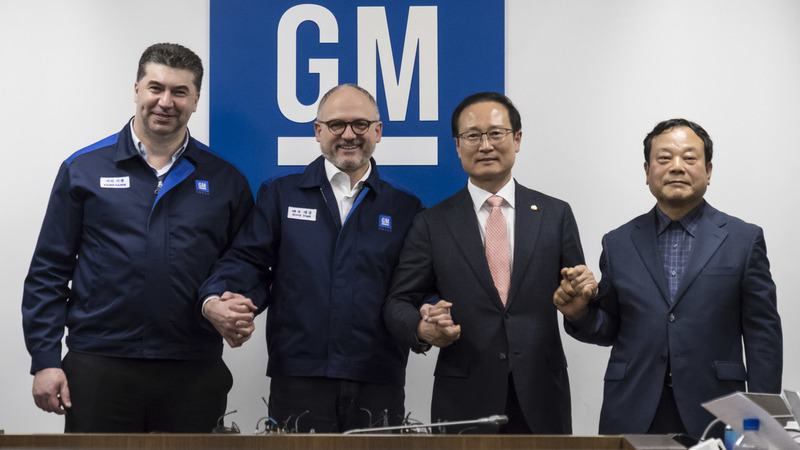 |
|
GM Korea Chief Executive Kaher Kazem (left), GM Executive Vice President Barry Engle, National Assembly member Hong Young-pyo, chair of the Environment and Labor Committee, and Moon Seung, Moon Seung president of Dasung, which represents GM Korea’s subcontractors, hold hands following completion of a labor deal at the company’s Bupyeong plant on Apr. 23. (by Kim Seong-gwang, staff photographer)
|
Injunction regarding non-transparent management practices
Korea Development Bank (KDB), GM Korea’s second-largest shareholder, is pursuing legal action against the automaker’s non-transparent management practices four months after the conclusion of a plan for its management normalization. With GM Korea’s July announcement of plans to separate its R&D and production corporations raising questions about possible withdrawal preparations, KDB’s decision to resort to overt legal action comes after its requests for an explanation have failed to produce a clear answer over the past two months. “We have applied for an injunction [against attempts to establish a new corporation],” KDB chairman Lee Dong-gull explained in a Sept. 11 meeting with reporters at the KDB headquarters in Seoul’s Yeouido neighborhood to mark his first year since taking over the position. “We’re doing it because of the potential risks,” he added. Injunction follows GM Korea’s plans to establish separate R&D corporation Indeed, KDB was confirmed to have applied with a court on Sept. 7 for an injunction against GM Korea convening a general shareholders’ meeting. Following the South Korean government and KDB’s May 10 agreement with GM’s head office in the US on a GM Korea management normalization plan, GM Korea president Kaher Kazem stated plans to establish a new R&D corporation while announcing a new investment plan on July 20. The announcement has drawn vehement objections from the GM Korea union, which argues that the “splitting of the current single corporation into two different ones with production factory and R&D functions raises suspicions that their intent is a second factory closure or a selloff.” Lee has been outspoken about his frustration with GM resorting the same lack of transparency about its management practices with KDB, which is a key shareholder with veto authority. “The issue of the new corporation being established came up in the form of a report rather than a concrete item at the [GM Korea] board meeting in late July and early August,” he said. “We need some information to be able to take measures, and we’ve been unable to get a clear answer,” he added. Lee also said he was “aware that the outside board director [recommended by KDB] has been requested that the specifics of the new corporation, its anticipated effects, and its aims be brought up at the board meeting,” adding that KDB had “been making similar demands.” “While we are not necessarily opposed, their unilateral pursuit runs counter to the spirit of the basic [management normalization] agreement and carries potential risks. That is why we applied for the injunction,” he explained. KDB’s legal action based on legal contract The remarks amount to an overt claim by KDB that even its recommended outside director has failed to receive an adequate explanation, leaving the bank no option but to take legal action. The South Korean government and KDB previously agreed to provide an addition 810 billion won (US$719 million) in support to GM Korea and allocate tens of billions of won to the domestic parts industry and other R&D ecosystem citing the “cost-effectiveness in terms of job,” despite facing criticisms over the contributions of taxpayer money to a private business. The decision was based on the assumptions that GM was committed to operating GM Korea in the long term, and that KDB had a say in management and the means to prevent a factory withdrawal as the second-largest shareholder. Lee Dong-gull made it clear that KDB’s measure was based on the legally binding contract it signed with GM Korea. “The reason [for the injunction application] is because everything is unclear – whether [the decision] is favorable or unfavorable, whether it’s subject to veto authority or not, whether it’s a matter for union discussions or not,” he said. “The one thing that is definite is that a basis for legal action was established in the basic contract [between KDB and GM],” he added. A KDB official said the move was intended “to signal that we’re not simply going to stand around after the money was invested and watch as GM returns to the same non-transparent management approach.” “It’s our commitment to making sure management decisions that we are not aware of are not put before the general shareholders’ meeting, including the establishment of the new corporation,” the official added. By Jung Se-ra and Hong Dae-seon, staff reporters Please direct comments or questions to [english@hani.co.kr]






